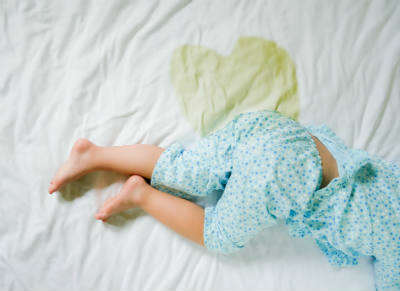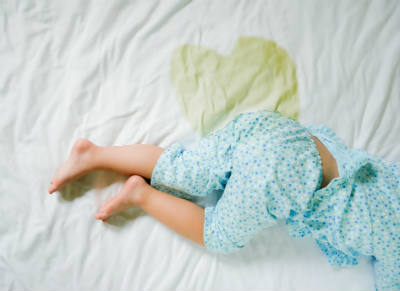Yes, as a slideshow at WebMD.com acknowledges, bedwetting can be stressful. But, it’s a normal part of growing up with most children not staying dry until age three—and not a concern until the child is around the age of six. Families simply need to work towards dry nights—and here are some tips:
- As a parent, offer support to your child. He or she isn’t going to wet the bed on purpose.
- Bedwetting isn’t typically part of a medical condition, physical or emotional.
- Bedwetting often runs in families so, if you or your child’s other parent wet the bed during formative years, share that information with your child. This will help him or her to feel less alone, less embarrassed and more reassured that he or she will outgrow this.
To stop bedwetting, the treatment is “relatively straightforward, though it takes effort, consistency, patience and time.” That quote is from PsychologyToday.com, and step one is to remove the shame. Let your child know this isn’t a big deal.
Parents typically try to address bedwetting by restricting fluids and using pull-ups at night. Here is commentary on those strategies from the article:
- Go ahead and restrict fluids, especially caffeine, right before bedtime. But don’t go too far in restrictive fluids as this isn’t healthy or effective.
- Understand that the use of pull-ups is a stopgap measure at best.
What is recommended to stop bedwetting:
- Get your child on a very predictable bedtime schedule, one that includes going to the bathroom right before bed. Use a mattress pad or cover that makes cleanup easier.
- Assuming that you go to bed later than your child, wake him or her up before you go to bed so that he or she can pee again. If this is done consistently, your child will begin to wake to use the bathroom without assistance, and this can often solve the issue.
- Reward dry nights and, as much as possible, ignore accidents.
Here are additional tips, ones from the Cleveland Clinic. Eliminate bladder irritants, which can include chocolate milk and cocoa, citrus juices, artificial flavors, dyes and sweeteners. Determine if constipation is a problem because this can present itself as a bladder issue, especially at night. This affects about one third of children who wet the bed. Interestingly enough, this expert does not agree with waking up your child at night, but she does suggest a bedwetting alarm if other options fail. This alarm gets clipped onto underwear or a bed pad, and it goes off when moisture is detected. If the alarm goes off, parents should wake the child and get him or her into the bathroom. You can’t expect the alarm to wake your child, especially if he or she is a deep sleeper.
When to Be Concerned
Inside.AkronChildrens.org lists times when you should seek medical advice. They include “blood in the urine, trouble with constipation, any neurological signs (trouble waking, for example).” Also look for new stressors in your child’s life and make an appointment with your pediatrician if you are concerned about any warning signs you see, because it’s important to deal with underlying medical conditions associated with these symptoms.




